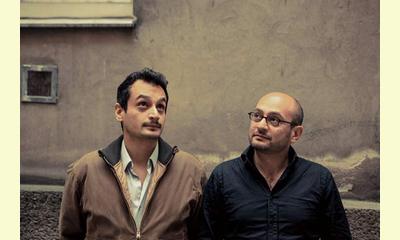|
|
Everyday Rebellion: Interview with Filmmakers Arash and Arman Riahi
an article by Yosef Brody, Truthout (abridged)
Video: Everyday rebellion
Have we entered a golden age of global activism?
Uprisings have been sprouting regularly for several
years, grabbing headlines and changing political
agendas at the highest levels. What, if anything, do
these various movements have in common?

Arash T. Riahi and Arman T. Riahi. (Photo: © 2013 Everyday Rebellion)
click on photo to enlarge
The inspired new documentary from the Riahi
Brothers, Everyday Rebellion, answers this
question by focusing on method. The film lovingly
examines contemporary global nonviolence in its
diversity and creativity, building on recent
academic research showing that nonviolent
resistance movements have been twice as effective
in the past century in achieving their stated
goals compared with violent resistance movements.
Experts in nonviolence research and philosophy
reinforce stories at the grass roots as the film
brings us into streets and homes, crisscrossing
continents and causes. The Riahi Brothers, who
were born in Iran and raised in Austria, paint
gracefully with a broad brush. They deal head-on
with the harsh realities of human life, but the
tone never strays too far from hopeful and
optimistic. If one image characterizes Everyday
Rebellion, it is probably the extended shot of a
balloon dancing amid city traffic, somehow
managing to avoid getting crushed.
Among many stops on a whirlwind tour, we spend
time in Madrid with the Indignados; in Tehran with
the Green revolutionaries; with members of FEMEN
in Kiev, Paris and Stockholm; with Occupy Wall
Street in New York; and with Syrian activists
devoted to nonviolent resistance against the
regime of Bashar al-Assad. Adroit editing reveals
the underlying thematic links between these
movements by emphasizing overlaps in their
content, such as how they respond to state
violence. In this way, the film reminds us that
these are not isolated struggles; what may appear
to be disparate movements inspire, feed off and
even communicate with each other. . .
The heart of the film lies in the segments where
the political meets the personal. Particularly
moving is the story of Inna Shevchenko, a FEMEN
organizer from Ukraine known for her bold, bare-
breasted direct actions. She was forced to flee
her native country in 2012 after facing death
threats and getting stalked by the Ukrainian
secret police. (She told me that she continues to
receive death threats to this day, adding that
when audience members at festival screenings come
up to give her hugs she can't help but wonder if
they might try to attack.) Watching her train new
activists in France, where she was granted
political asylum, and seeing how FEMEN also faces
severe violence there, we sense how nonviolent
struggles are fundamentally borderless.
Ultimately, we witness only a smattering of such
struggles. Properly told, this film would never
really end. The Riahi Brothers seem to understand
this limitation instinctually, which is why they
have decided to promote the documentary as one
piece of an innovative cross-media project; in
addition to the film, they are developing an
educational website and a smartphone app that uses
augmented reality technology, maps that show where
global nonviolent action is taking place in real
time, and a telecommunications tool that can
circumvent Internet shutdowns. The tech-savvy
brothers have a keen sense of how - beyond mere
clicktivism - digital tools can be applied to
social justice work in the streets. (These
projects can all be followed at EverydayRebell
ion.net.) . . .
|








|
DISCUSSION
Question(s) related to this article:
Does research show that nonviolence works?,
* * * * *
Latest reader comment:
Did the writings on nonviolence by Gene Sharp help inspire the movements of the Arab Spring in Egypt and elsewhere?
This is debatable. The New York Times said "yes" and some Egyptians, for example, the blogger Karim Alrawi say "no".
However, it should be recognized that the ideas of nonviolent resistance have a way of transcending borders and centuries. Nelson Mandela was influenced by Martin Luther King who was influenced in turn by Mahatma Gandhi who was influenced in turn by Henry David Thoreau.

|
|








